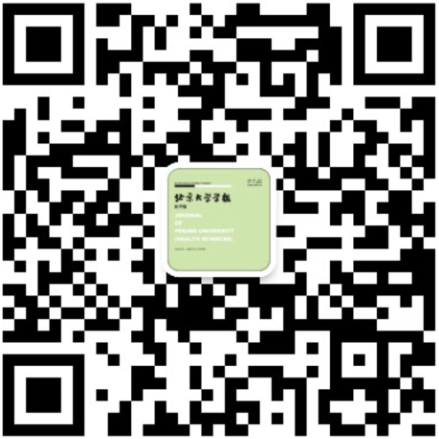北京大学学报(医学版) ›› 2020, Vol. 52 ›› Issue (3): 506-513. doi: 10.19723/j.issn.1671-167X.2020.03.017
2型糖尿病患者大五人格特征与自我管理态度的相关性
- 北京大学公共卫生学院社会医学与健康教育系,北京 100191
Relationship between the five-factor model of personality traits and self-management attitude of patients with type 2 diabetes
Ze-ming LI,Min GAO,Xue-ying CHEN,Xin-ying SUN( )
)
- Department of Social Medicine and Health Education,School of Public Health, Peking University Health Center, Beijing 100191, China
摘要:
目的 探讨2型糖尿病患者不同人格特征与用药、运动、饮食等自我管理态度的相关性。方法 以北京市通州区、顺义区4个社区卫生服务中心所属的22个社区卫生服务站的2型糖尿病患者作为调查对象,采用中国大五人格量表及包括用药、运动、饮食态度在内的自行设计的量表。结果 研究最终纳入642例调查对象,其中男女性别比基本持平,年龄在61岁以上占61.21%。不同性别的患者在神经质人格得分中存在差异(P<0.05),不同年龄阶段在宜人性和开放性人格中存在差异(P<0.05),不同文化程度在开放性和外向性人格中存在差异(P<0.05), 不同收入水平在宜人性、开放性、外向性人格上均存在差异(P<0.05)。大五人格特征与用药、运动、饮食态度的相关分析中,2型糖尿病患者感知用药障碍的3个条目与神经质人格呈正相关(r值分别为0.125、0.187、0.151,P值均<0.05); 感知运动障碍的4个条目与神经质人格呈正相关(r值分别为0.163、0.129、0.119、0.104,P值均<0.05),感知运动益处的5个条目与严谨性人格(r值分别为0.156、0.111、0.131、0.104、0.131,P值均<0.05)、2个条目与宜人性人格(r值分别为0.092、0.078,P值均<0.05)、4个条目与外向性人格(r值分别为 0.079、0.122、0.115、0.123,P值均<0.05)呈正相关;感知饮食障碍的3个条目与神经质人格呈正相关(r值分别为0.115、0.137、0.108,P值均<0.05), 2个条目与严谨性人格(r值分别为-0.126、-0.161,P值均<0.05)、2个条目与宜人性人格(r值分别为-0.103、-0.115,P值均<0.05)呈负相关。典则相关分析中,根据3组典则变量公式组合典则结构图,神经质人格与宜人性人格在人格特征中起主要作用,用药、运动、饮食态度中的“障碍”条目起主要作用。结论 5种人格特征与2型糖尿病患者自我管理态度存在相关性,不同人格特征对患者自我管理态度均有影响,尤其了解神经质人格对提高2型糖尿病患者的自我管理具有一定意义。因此,在2型糖尿病社区管理和疾病自我管理中应注意心理因素的影响,可根据患者的人格特征开展个性化护理及健康宣教。
中图分类号:
- R587.1
| [1] | Ma RCW. Epidemiology of diabetes and diabetic complications in China[J]. Diabetologia. 2018,61(6):1249-1260. |
| [2] | Cho NH, Shaw JE, Karuranga S, et al. IDF diabetes atlas: global estimates of diabetes prevalence for 2017 and projections for 2045[J]. Diabetes Res Clin Pract, 2018,138(4):271-281. |
| [3] | 宋玮, 宋道平, 陈利云, 等. 高血压患者人格特征对服药依从性的影响[J]. 公共卫生与预防医学, 2016,27(4):110-112. |
| [4] | Ċukić I, Weiss A. Personality and diabetes mellitus incidence in a national sample[J]. J Psychosom Res, 2014,77(3):163-168. |
| [5] | 杨婷婷. 人格特质对2型糖尿病患者自我管理行为及心血管风险评估的影响[D]. 南京中医药大学, 2018. |
| [6] | 易淑媛, 张新华, 罗成宜, 等. 肺结核患者人格特征与应对方式的相关性研究[J]. 中国健康教育, 2020,36(1):66-70. |
| [7] |
Costa PT, Terracciano A, Mccrae RR. Gender differences in personality traits across cultures: robust and surprising findings[J]. J Pers Soc Psychol, 2001,81(2):322-331.
doi: 10.1037/0022-3514.81.2.322 pmid: 11519935 |
| [8] |
Bagby RM, Schuller DR, Marshall MB, et al. Depressive personality disorder: rates of comorbidity with personality disorders and relations to the five-factor model of personality[J]. J Pers Disord, 2005,18(6):542-554.
pmid: 15615666 |
| [9] | Ċukić I, Mõttus R, Luciano M, et al. Do personality traits moderate the manifestation of type 2 diabetes genetic risk[J]. J Psychosom Res, 2015,79(4):303-308. |
| [10] |
Skinner TC, Bruce DG, Davis TM, et al. Personality traits, selfcare behaviours and glycaemic control in type 2 diabetes: the fremantle diabetes study phase Ⅱ[J]. Diabet Med, 2014,31(4):487-492.
pmid: 24147848 |
| [11] | Lane JD, Mccaskill CC, Williams PG, et al. Personality correlates of glycemic control in type 2 diabetes[J]. Diabetes Care, 2000,23(9):1321-1325. |
| [12] |
Mõttus R, Realo A, Allik J, et al. Personality traits and eating habits in a large sample of Estonians[J]. Health Psychol, 2012,31(6):806-814.
pmid: 22268715 |
| [13] | 李丽萍. 2型糖尿病患者自我管理行为在不同人格特质上的干预效果分析[D]. 山西医科大学, 2018. |
| [1] | 鲍雷,蔡夏夏,张明远,任磊磊. 维生素D3对2型糖尿病小鼠轻度认知障碍的改善作用及机制研究[J]. 北京大学学报(医学版), 2023, 55(4): 587-592. |
| [2] | 于欢,杨若彤,王斯悦,吴俊慧,王梦莹,秦雪英,吴涛,陈大方,武轶群,胡永华. 2型糖尿病患者使用二甲双胍与缺血性脑卒中发病风险的队列研究[J]. 北京大学学报(医学版), 2023, 55(3): 456-464. |
| [3] | 张晓悦,林雨欣,蒋莹,张蓝超,董芒艳,池海谊,董浩宇,马利军,李智婧,常春. 自我效能在2型糖尿病患者自我管理能力和自我管理行为间的中介效应[J]. 北京大学学报(医学版), 2023, 55(3): 450-455. |
| [4] | 陈平,黎泽明,郭怡,孙昕霙,Edwin B.FISHER. 基于大五人格理论应用潜在剖面分析探究2型糖尿病患者的用药依从性[J]. 北京大学学报(医学版), 2021, 53(3): 530-535. |
| [5] | 谢江,李菲. 睡眠重叠综合征与糖尿病发病率的横断面调查研究[J]. 北京大学学报(医学版), 2019, 51(2): 252-255. |
| [6] | 刘胜兰,娜荷芽,李伟豪,云青萍,姜学文,刘婧楠,常春. 基于自我决定理论的糖尿病自我管理行为干预效果[J]. 北京大学学报(医学版), 2018, 50(3): 474-481. |
| [7] | 张旭熙,吴士艳,王冯彬,玛依努尔·于苏甫,孙凯歌,胡康,张幸,孙昕霙,Edwin B. FISHER. 社区糖尿病患者获得社会支持与自我管理行为的相关关系[J]. 北京大学学报(医学版), 2017, 49(3): 455-461. |
|
||






